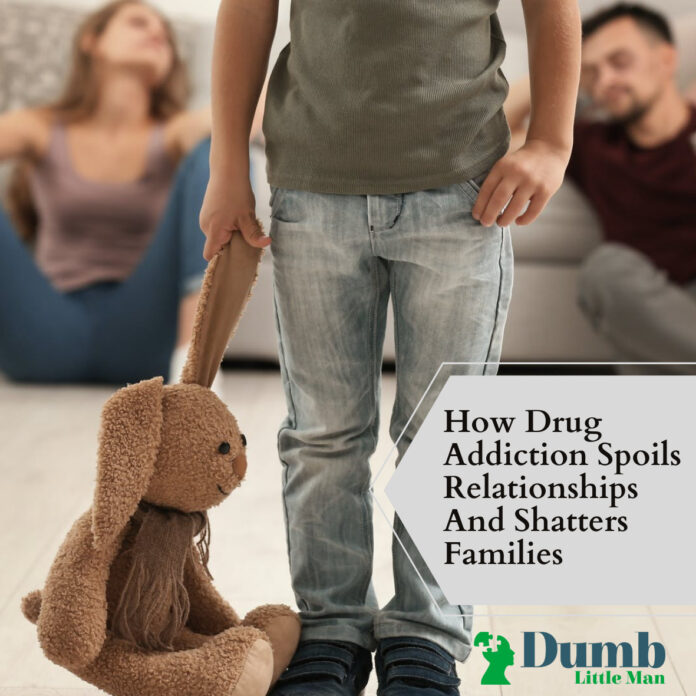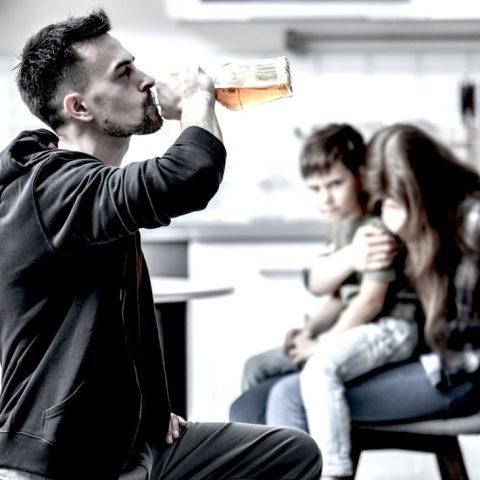

“Almost anything can be preserved in alcohol, except health, happiness, and money.” —Mary Wilson Little.
The effects of drug addiction cannot be confined to a single domain. From the complete demoralization of an individual to consequences at a global level, it is genuinely a tremendous challenge of the 21st century.
However, the true extent of drug addiction’s psychological, emotional, and physical damages can be observed as to how drug addiction spoils relationships and shatters families.
The devastating effects of loved ones create an abundance of unintended consequences that once spiral out of control creates a never-ending cycle of suffering.
Drug Addiction in the USA
According to the National Survey on Drug Use and Health, more than twenty-four million Americans are addicted to alcohol and drugs. This number, which has had an upward climb in recent years, offers an insight into the destruction of lives at an unprecedented rate.
In 2019, more than 70,000 people died of a drug overdose. It is estimated that this figure is expected to persist in the coming years or even increase.
Opioid-related overdose deaths were responsible for a staggering 49,000 deaths in 2019.
Since the year 2000, an estimated 700,000 people have lost their lives to drug overdoses.
Drug abuse and alcohol addiction was cited as the third primary reason for divorces in the U.S, an estimated 7.3%.
The pandemic has only worsened this health crisis and continues to destroy American lives. The year 2020 saw a record number of drug-related deaths, an astonishing 93,000+.
Drug Addiction and its Impact on Daily Life
Drug addiction does not hinder one instantly. Instead, it is a process of accumulation, a slow piling up of dependency. The transition from recreation to full-blown addiction is a step-by-step process, but the change is so seamless that before one can come to terms with the fact, it is already too late.
 Photo: narcononarrowhead.org
Photo: narcononarrowhead.org
This also reflects in a person’s, let’s say, professional life, either a student or a job holder. With time, drug addiction makes them incapable of performing even the simplest of tasks like showing up on time, and as time passes, they are entirely skipping college and failing miserably at the workplace.
Drug addiction ruins one’s professional engagements, eventually leading to dropping out or quitting one’s job.
⫸ Dopamine Exhaustion
Dopamine is the essential neurotransmitter in the human body and is necessary for feelings of pleasure and wakefulness. Constant drug abuse disturbs the release of dopamine in the body. Drugs like heroin create a sense of instant euphoria by activating dopamine and serotonin receptors.
Once addicted to the drug, the body fails to produce normal levels of dopamine without the prescription leading to feelings of lethargy and agitated depression, which in the long run contributes to mental health problems.
⫸ Comport Drugs
One of the most dangerous effects of drug addiction on a person’s family life. Drug dependency reaches a stage where it is the only thing providing closure and satisfaction. In this process, the drug replaces one’s family and friends as the source of happiness and comfort and leads to one’s alienation from family events and gatherings that he or she previously enjoyed.
This creates a situation where the only thing or event a person is looking forward to is using the drug instead of interacting with family and loved ones.
⫸ Domestic Abuse
Drug addicts have disruptive mental states and behaviors, making it difficult to manage their emotions and actions if confronted with something that challenges them. This leads to a state of panic in which addicts have violated their intimate partners either physically or emotionally.
 Photo: nocamels.com
Photo: nocamels.com
A vast majority of domestic abuse cases are rooted in substance abuse where addicts pressed to shoulder responsibility and quit drugs cannot control their behavior and hurt their intimate partner.
⫸ Affect on Children
Children of drug-abusing parents go through a torturous ordeal. These children go from affectionless childhood to challenging adulthood. Many children develop dual disorders from a very young age and often abuse drugs to cope with their depression symptoms. Furthermore, these children develop feelings of hatred towards their parents as they get older, which makes anger and resentment their tools for handling all situations and problems in the future.
A Drug-Infested Relationship is a Relationship of Deceit and Lies!
 Photo: midwestrecoverycenters.com
Photo: midwestrecoverycenters.com
The guilt and shame associated with addiction is an almost impossible challenge to stand up. This forces many addicts to use denial and lies to avoid challenging situations and comfort family members using lies. This, in turn, reduces the level of trust among partners in the long run as well. Lack of confidence leads to loss of affection and is a significant contributor to drug-related divorces.
The Ripple Effect
Another dangerous trend shattering families mainly observed siblings. Often stemming from the addictive behaviors of the eldest sibling, addiction habits start to trickle down to the younger siblings.
The disruptive behavior of the eldest sibling and its consequences, ranging from chaotic household to agitated parents, lead younger siblings to use drugs to cope with the problems as well.
The ripple effect makes it impossible for the family to escape from the hold of drug addiction which becomes more of a psychological challenge than a physical one and slowly eats away at the relationships amongst family members.
Conclusion
Drug Addiction is a global epidemic and is worsening with time. It has been destroying relationships and shattering families for years now. The increased production of worldwide opium and illicit trafficking of drugs will only exacerbate the situation until a global war on drugs is not brought about.
Drug addiction needs to be tackled at a physical level, but one needs to consider the socio-psychological level to completely solve the problem and save families from this miserable ordeal.
Like this Article? Subscribe to Our Feed!
Author: John T. Maggio ChoicePoint
John T. Maggio MA, LCADC, LAC, has a dual clinical license in Substance Use and Mental Health Treatment. He is currently a clinical specialist and the Program Director of ChoicePoint Health, Ambulatory detox, Intensive Outpatient, and Outpatient Treatment Center.


